Child Development: Practitioner's Role and Partnership Approach
VerifiedAdded on 2020/10/22
|10
|2898
|94
Report
AI Summary
This report provides a comprehensive analysis of child development, focusing on the crucial role of early year practitioners. It explores various aspects of child development, including cognitive, communication, physical, emotional, and social growth. The report highlights the significance of these practitioners in fostering holistic development, emphasizing their role as facilitators and mentors. Furthermore, it evaluates the impact of a partnership approach involving practitioners, families, and the community in enhancing a child's learning and development. The analysis covers the values contributed by parents and carers, underscoring the importance of their involvement in creating a secure and supportive environment for children. The report emphasizes the need for practitioners to identify and address children's individual needs and interests to optimize their developmental journey. The report concludes by highlighting the importance of collaboration between practitioners, families, and the community to ensure the best outcomes for children's growth and development.

Child development
Paraphrase This Document
Need a fresh take? Get an instant paraphrase of this document with our AI Paraphraser
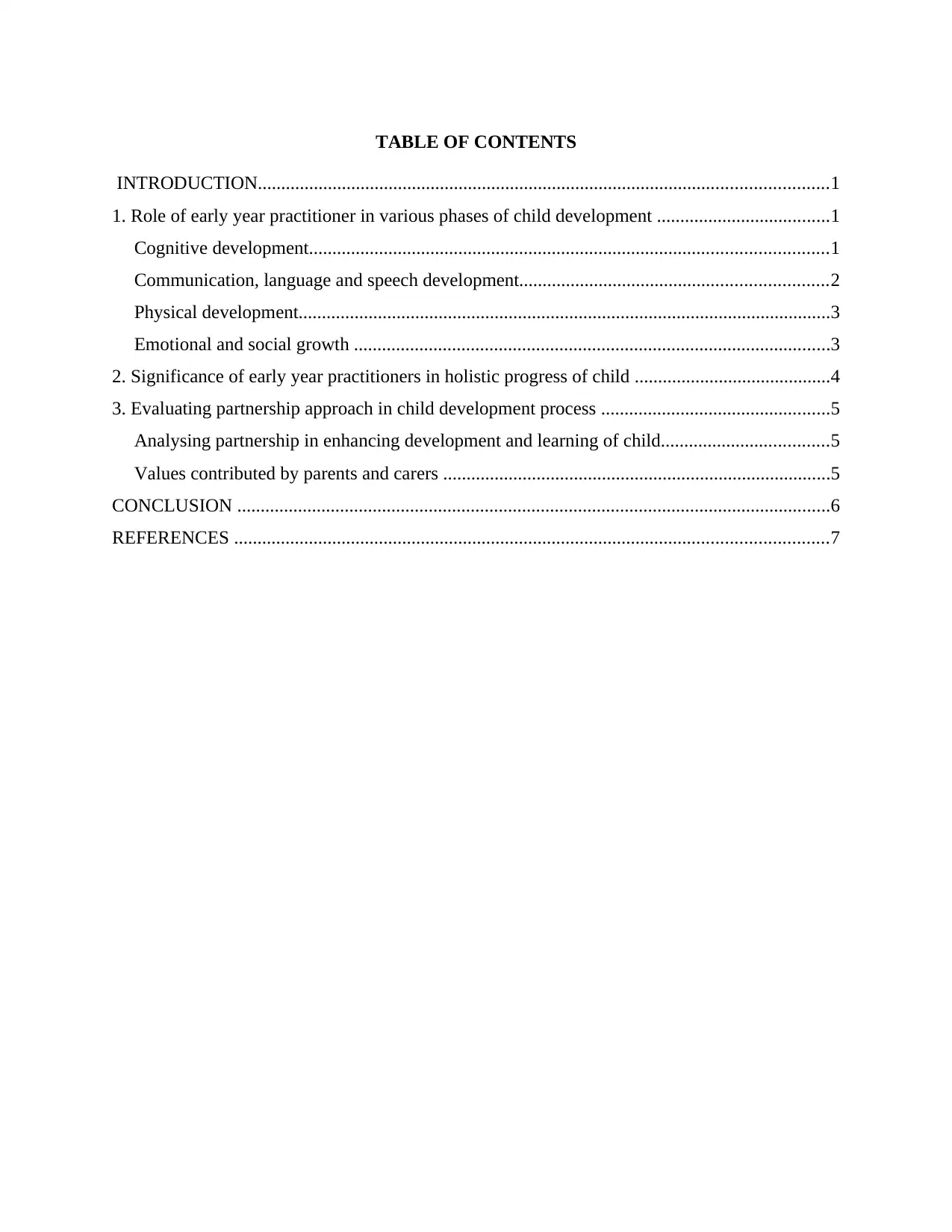
TABLE OF CONTENTS
INTRODUCTION..........................................................................................................................1
1. Role of early year practitioner in various phases of child development .....................................1
Cognitive development...............................................................................................................1
Communication, language and speech development..................................................................2
Physical development..................................................................................................................3
Emotional and social growth ......................................................................................................3
2. Significance of early year practitioners in holistic progress of child ..........................................4
3. Evaluating partnership approach in child development process .................................................5
Analysing partnership in enhancing development and learning of child....................................5
Values contributed by parents and carers ...................................................................................5
CONCLUSION ...............................................................................................................................6
REFERENCES ...............................................................................................................................7
INTRODUCTION..........................................................................................................................1
1. Role of early year practitioner in various phases of child development .....................................1
Cognitive development...............................................................................................................1
Communication, language and speech development..................................................................2
Physical development..................................................................................................................3
Emotional and social growth ......................................................................................................3
2. Significance of early year practitioners in holistic progress of child ..........................................4
3. Evaluating partnership approach in child development process .................................................5
Analysing partnership in enhancing development and learning of child....................................5
Values contributed by parents and carers ...................................................................................5
CONCLUSION ...............................................................................................................................6
REFERENCES ...............................................................................................................................7
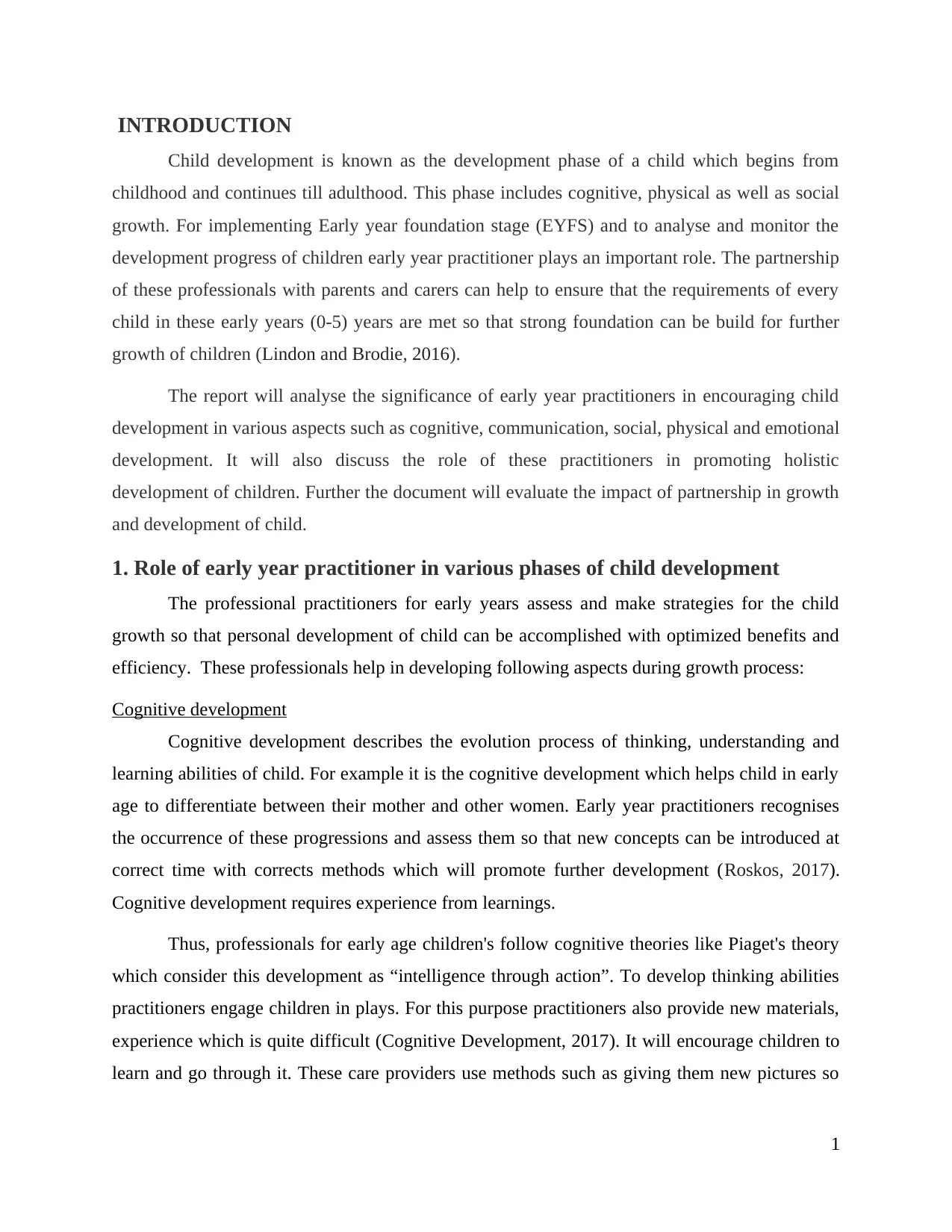
INTRODUCTION
Child development is known as the development phase of a child which begins from
childhood and continues till adulthood. This phase includes cognitive, physical as well as social
growth. For implementing Early year foundation stage (EYFS) and to analyse and monitor the
development progress of children early year practitioner plays an important role. The partnership
of these professionals with parents and carers can help to ensure that the requirements of every
child in these early years (0-5) years are met so that strong foundation can be build for further
growth of children (Lindon and Brodie, 2016).
The report will analyse the significance of early year practitioners in encouraging child
development in various aspects such as cognitive, communication, social, physical and emotional
development. It will also discuss the role of these practitioners in promoting holistic
development of children. Further the document will evaluate the impact of partnership in growth
and development of child.
1. Role of early year practitioner in various phases of child development
The professional practitioners for early years assess and make strategies for the child
growth so that personal development of child can be accomplished with optimized benefits and
efficiency. These professionals help in developing following aspects during growth process:
Cognitive development
Cognitive development describes the evolution process of thinking, understanding and
learning abilities of child. For example it is the cognitive development which helps child in early
age to differentiate between their mother and other women. Early year practitioners recognises
the occurrence of these progressions and assess them so that new concepts can be introduced at
correct time with corrects methods which will promote further development (Roskos, 2017).
Cognitive development requires experience from learnings.
Thus, professionals for early age children's follow cognitive theories like Piaget's theory
which consider this development as “intelligence through action”. To develop thinking abilities
practitioners engage children in plays. For this purpose practitioners also provide new materials,
experience which is quite difficult (Cognitive Development, 2017). It will encourage children to
learn and go through it. These care providers use methods such as giving them new pictures so
1
Child development is known as the development phase of a child which begins from
childhood and continues till adulthood. This phase includes cognitive, physical as well as social
growth. For implementing Early year foundation stage (EYFS) and to analyse and monitor the
development progress of children early year practitioner plays an important role. The partnership
of these professionals with parents and carers can help to ensure that the requirements of every
child in these early years (0-5) years are met so that strong foundation can be build for further
growth of children (Lindon and Brodie, 2016).
The report will analyse the significance of early year practitioners in encouraging child
development in various aspects such as cognitive, communication, social, physical and emotional
development. It will also discuss the role of these practitioners in promoting holistic
development of children. Further the document will evaluate the impact of partnership in growth
and development of child.
1. Role of early year practitioner in various phases of child development
The professional practitioners for early years assess and make strategies for the child
growth so that personal development of child can be accomplished with optimized benefits and
efficiency. These professionals help in developing following aspects during growth process:
Cognitive development
Cognitive development describes the evolution process of thinking, understanding and
learning abilities of child. For example it is the cognitive development which helps child in early
age to differentiate between their mother and other women. Early year practitioners recognises
the occurrence of these progressions and assess them so that new concepts can be introduced at
correct time with corrects methods which will promote further development (Roskos, 2017).
Cognitive development requires experience from learnings.
Thus, professionals for early age children's follow cognitive theories like Piaget's theory
which consider this development as “intelligence through action”. To develop thinking abilities
practitioners engage children in plays. For this purpose practitioners also provide new materials,
experience which is quite difficult (Cognitive Development, 2017). It will encourage children to
learn and go through it. These care providers use methods such as giving them new pictures so
1
⊘ This is a preview!⊘
Do you want full access?
Subscribe today to unlock all pages.

Trusted by 1+ million students worldwide

that they can learn to understand from visualisation and language instructions or to producing
sounds and age related games. It will help them to furnish their learning skills.
The early year practitioners identify the ability and skills of children that how they take
these activities and what is the growth level of their learning. On the basis of this assessment
they can decide the effectiveness of these approaches and if these are not sufficient enough then
new learning methods can be employ. It will help parents and carers to monitor the stages of
cognitive evolution (Cashdan and Meadows, 2017). They can guide with advance methods such
as puzzles, singing or cooking activities like counting and naming ingredients can boost the
development rate.
Communication, language and speech development
Early year practitioners also aims to fulfil the speech, language and communication needs
(SLCN) during child development. They regularly monitor that the child is developing skills for
emergent writing and reading as well as speaking and listening. The early year staff members
supports and encourages the language acquisition with monitoring and observation. It allows
them to identify potential difficulties faced by child during speaking or communicating. Early
staff make attempts so that child can meet SLCN and in school years he or she does not face any
difficulties in making friends or communicating with different people (Waite, 2017). It will also
help children's to express themselves in front of family.
The professionals create environment in which child can listen different sounds with
attention so that he can understand and respond accordingly. With the help of practical activities,
routine conversations, fun activities early practitioners offers opportunities to children so that
they can speak and listen to others. The children's have tendency to observe adults and to copy
them. Thus, early year professional must use good language skills otherwise it can create adverse
impact on the developing skills of child (How early years practitioners can help develop
children’s skills, 2016).
These practitioners can talk children everyday read books with them and can provide
description of surrounding objects for encouraging them to communicate. It will improve their
speech. In cases if early year staff feels that child is having difficulties in SLCN then they
provide support to child and can recommend speech therapist which can help children's in
resolving difficulties such as word formation, fluency and sentence formulation issues. This
2
sounds and age related games. It will help them to furnish their learning skills.
The early year practitioners identify the ability and skills of children that how they take
these activities and what is the growth level of their learning. On the basis of this assessment
they can decide the effectiveness of these approaches and if these are not sufficient enough then
new learning methods can be employ. It will help parents and carers to monitor the stages of
cognitive evolution (Cashdan and Meadows, 2017). They can guide with advance methods such
as puzzles, singing or cooking activities like counting and naming ingredients can boost the
development rate.
Communication, language and speech development
Early year practitioners also aims to fulfil the speech, language and communication needs
(SLCN) during child development. They regularly monitor that the child is developing skills for
emergent writing and reading as well as speaking and listening. The early year staff members
supports and encourages the language acquisition with monitoring and observation. It allows
them to identify potential difficulties faced by child during speaking or communicating. Early
staff make attempts so that child can meet SLCN and in school years he or she does not face any
difficulties in making friends or communicating with different people (Waite, 2017). It will also
help children's to express themselves in front of family.
The professionals create environment in which child can listen different sounds with
attention so that he can understand and respond accordingly. With the help of practical activities,
routine conversations, fun activities early practitioners offers opportunities to children so that
they can speak and listen to others. The children's have tendency to observe adults and to copy
them. Thus, early year professional must use good language skills otherwise it can create adverse
impact on the developing skills of child (How early years practitioners can help develop
children’s skills, 2016).
These practitioners can talk children everyday read books with them and can provide
description of surrounding objects for encouraging them to communicate. It will improve their
speech. In cases if early year staff feels that child is having difficulties in SLCN then they
provide support to child and can recommend speech therapist which can help children's in
resolving difficulties such as word formation, fluency and sentence formulation issues. This
2
Paraphrase This Document
Need a fresh take? Get an instant paraphrase of this document with our AI Paraphraser

support from practitioners can avoid child from wide gap which can occur in his later life due to
communication and speech issues.
Physical development
In this stage of child development children develops abilities to establish relations with
their surrounding world. It is also accomplished by muscle strengthening and coordination
development so that their motor skills can be groomed. Early year practitioners play very crucial
role in this phase. These professionals remain enthusiastic, participating and energetic in physical
activities (MacQuarrie, Nugent and Warden, 2015). It motivates both child and parents to
actively coordinate and take part in this phase. They create opportunities so that child can
practice new skills and movement. If child required some specific training courses and assisting
resources then they provide suggestion for it. This approach helps child to meet their
requirements of physical development.
Early years staff also provides guidelines to parents that how they can enhance the
physical development of children and what precautions and care measurements they must follow.
The support from these staff members enables child to make balance during play without
compromising their safety. During activity planning early year practitioners also monitors that
efficient adult-led physical activities are used for the child. They try to make these activities
more fun loving and interesting so that child can participate with interest and excitement and has
eager to learn them again and again.
The professional must plan physical activities according to skills and age of child which
are achievable. For example if in a group of children's if only one child is unable to jump and
rest can jump easily then practitioners must find out additional support activities for the child
who cannot jump. Thus, early practitioners are important to analyse the need and skills of child
in early years (Panter‐Brick and et.al., 2014).
Emotional and social growth
The social and emotional development of children helps them to groom their skills like
being social, making friends, improving personal traits like confidence, memory and learning
abilities as well as developing curiosity. For promoting the social and emotional competence
yearly professionals helps children to recognize and express their emotions, to expand their
friend zone as well as to resolve the social conflicts like issues between them and their
3
communication and speech issues.
Physical development
In this stage of child development children develops abilities to establish relations with
their surrounding world. It is also accomplished by muscle strengthening and coordination
development so that their motor skills can be groomed. Early year practitioners play very crucial
role in this phase. These professionals remain enthusiastic, participating and energetic in physical
activities (MacQuarrie, Nugent and Warden, 2015). It motivates both child and parents to
actively coordinate and take part in this phase. They create opportunities so that child can
practice new skills and movement. If child required some specific training courses and assisting
resources then they provide suggestion for it. This approach helps child to meet their
requirements of physical development.
Early years staff also provides guidelines to parents that how they can enhance the
physical development of children and what precautions and care measurements they must follow.
The support from these staff members enables child to make balance during play without
compromising their safety. During activity planning early year practitioners also monitors that
efficient adult-led physical activities are used for the child. They try to make these activities
more fun loving and interesting so that child can participate with interest and excitement and has
eager to learn them again and again.
The professional must plan physical activities according to skills and age of child which
are achievable. For example if in a group of children's if only one child is unable to jump and
rest can jump easily then practitioners must find out additional support activities for the child
who cannot jump. Thus, early practitioners are important to analyse the need and skills of child
in early years (Panter‐Brick and et.al., 2014).
Emotional and social growth
The social and emotional development of children helps them to groom their skills like
being social, making friends, improving personal traits like confidence, memory and learning
abilities as well as developing curiosity. For promoting the social and emotional competence
yearly professionals helps children to recognize and express their emotions, to expand their
friend zone as well as to resolve the social conflicts like issues between them and their
3
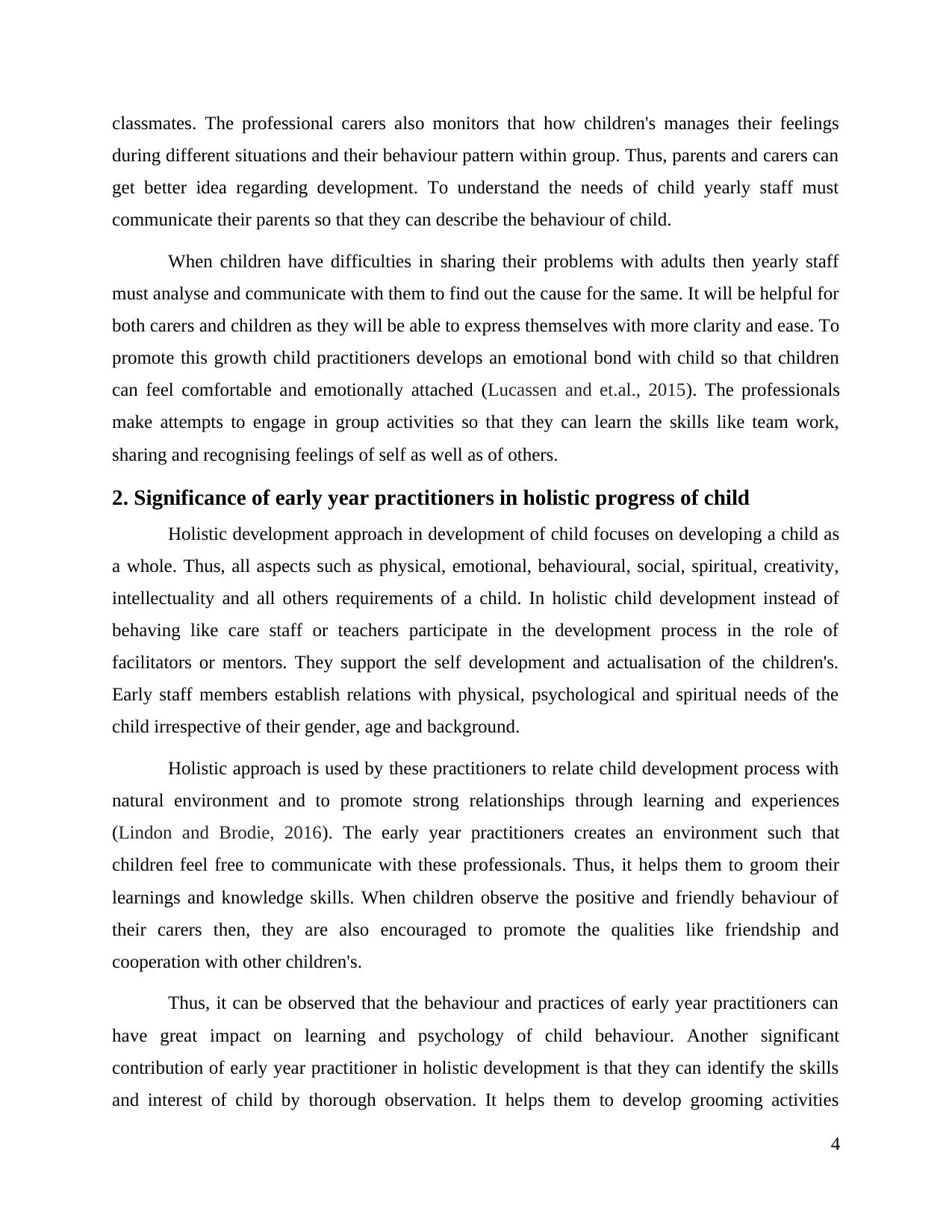
classmates. The professional carers also monitors that how children's manages their feelings
during different situations and their behaviour pattern within group. Thus, parents and carers can
get better idea regarding development. To understand the needs of child yearly staff must
communicate their parents so that they can describe the behaviour of child.
When children have difficulties in sharing their problems with adults then yearly staff
must analyse and communicate with them to find out the cause for the same. It will be helpful for
both carers and children as they will be able to express themselves with more clarity and ease. To
promote this growth child practitioners develops an emotional bond with child so that children
can feel comfortable and emotionally attached (Lucassen and et.al., 2015). The professionals
make attempts to engage in group activities so that they can learn the skills like team work,
sharing and recognising feelings of self as well as of others.
2. Significance of early year practitioners in holistic progress of child
Holistic development approach in development of child focuses on developing a child as
a whole. Thus, all aspects such as physical, emotional, behavioural, social, spiritual, creativity,
intellectuality and all others requirements of a child. In holistic child development instead of
behaving like care staff or teachers participate in the development process in the role of
facilitators or mentors. They support the self development and actualisation of the children's.
Early staff members establish relations with physical, psychological and spiritual needs of the
child irrespective of their gender, age and background.
Holistic approach is used by these practitioners to relate child development process with
natural environment and to promote strong relationships through learning and experiences
(Lindon and Brodie, 2016). The early year practitioners creates an environment such that
children feel free to communicate with these professionals. Thus, it helps them to groom their
learnings and knowledge skills. When children observe the positive and friendly behaviour of
their carers then, they are also encouraged to promote the qualities like friendship and
cooperation with other children's.
Thus, it can be observed that the behaviour and practices of early year practitioners can
have great impact on learning and psychology of child behaviour. Another significant
contribution of early year practitioner in holistic development is that they can identify the skills
and interest of child by thorough observation. It helps them to develop grooming activities
4
during different situations and their behaviour pattern within group. Thus, parents and carers can
get better idea regarding development. To understand the needs of child yearly staff must
communicate their parents so that they can describe the behaviour of child.
When children have difficulties in sharing their problems with adults then yearly staff
must analyse and communicate with them to find out the cause for the same. It will be helpful for
both carers and children as they will be able to express themselves with more clarity and ease. To
promote this growth child practitioners develops an emotional bond with child so that children
can feel comfortable and emotionally attached (Lucassen and et.al., 2015). The professionals
make attempts to engage in group activities so that they can learn the skills like team work,
sharing and recognising feelings of self as well as of others.
2. Significance of early year practitioners in holistic progress of child
Holistic development approach in development of child focuses on developing a child as
a whole. Thus, all aspects such as physical, emotional, behavioural, social, spiritual, creativity,
intellectuality and all others requirements of a child. In holistic child development instead of
behaving like care staff or teachers participate in the development process in the role of
facilitators or mentors. They support the self development and actualisation of the children's.
Early staff members establish relations with physical, psychological and spiritual needs of the
child irrespective of their gender, age and background.
Holistic approach is used by these practitioners to relate child development process with
natural environment and to promote strong relationships through learning and experiences
(Lindon and Brodie, 2016). The early year practitioners creates an environment such that
children feel free to communicate with these professionals. Thus, it helps them to groom their
learnings and knowledge skills. When children observe the positive and friendly behaviour of
their carers then, they are also encouraged to promote the qualities like friendship and
cooperation with other children's.
Thus, it can be observed that the behaviour and practices of early year practitioners can
have great impact on learning and psychology of child behaviour. Another significant
contribution of early year practitioner in holistic development is that they can identify the skills
and interest of child by thorough observation. It helps them to develop grooming activities
4
⊘ This is a preview!⊘
Do you want full access?
Subscribe today to unlock all pages.

Trusted by 1+ million students worldwide

according to the interest of child so that better results can be obtained. However, these service
providers also ensures that during learning the activities safety of child is not compromised
(Neaum, 2015). The learning environment and activities are as per the capabilities and age
limitations of the children. It is also the moral responsibility of practitioners that during
development phase if they identify certain issues like difficulty in speech or walking then these
facts must be reported to suitable authorities so that development goals can be achieved.
3. Evaluating partnership approach in child development process
Analysing partnership in enhancing development and learning of child
Early childhood practitioners can contribute the qualitative child development if they
work in partnership with family and community of child as well as by partnering with child
itself. This concept enables the practitioners to develop programs according to the experience
and routine of child. It will make it easy for child also as they will find it easy to relate with the
learning activities. The collaboration with family give children a more secure environment in
which they can enhance their learnings and trust on educators.
It may happen that practices of practitioners are effective but children may find it hard to
participate due to insecurity or hesitation. With the support of family and community members it
will be easy for early childhood educators to gain the trust of children's. Another significant
aspect which enhances the growth and development of children is that parents and families have
better understanding regarding the interests and needs of child (Nicol, 2016).
Thus, it will be more helpful for the care professionals to defined learning activities
which best suits the child need. Also, if there are certain issues which need to be highlighted or
consider then direct participation of parents will help practitioners to take suitable decisions. The
children have complete faith in their family and parents. They always follow the behavioural
pattern of their parents. Hence, it is essential that parents must follow appropriate skills. The
early childhood staff can help parents so that they can also become aware about the best practices
for their child and development goals can be achieved.
Values contributed by parents and carers
The family values and behaviour of parents have great impact on the child development.
In the initial period of childhood the children's spend their most of the times with their mother
and with development they start building relations and emotional connectivity with other family
5
providers also ensures that during learning the activities safety of child is not compromised
(Neaum, 2015). The learning environment and activities are as per the capabilities and age
limitations of the children. It is also the moral responsibility of practitioners that during
development phase if they identify certain issues like difficulty in speech or walking then these
facts must be reported to suitable authorities so that development goals can be achieved.
3. Evaluating partnership approach in child development process
Analysing partnership in enhancing development and learning of child
Early childhood practitioners can contribute the qualitative child development if they
work in partnership with family and community of child as well as by partnering with child
itself. This concept enables the practitioners to develop programs according to the experience
and routine of child. It will make it easy for child also as they will find it easy to relate with the
learning activities. The collaboration with family give children a more secure environment in
which they can enhance their learnings and trust on educators.
It may happen that practices of practitioners are effective but children may find it hard to
participate due to insecurity or hesitation. With the support of family and community members it
will be easy for early childhood educators to gain the trust of children's. Another significant
aspect which enhances the growth and development of children is that parents and families have
better understanding regarding the interests and needs of child (Nicol, 2016).
Thus, it will be more helpful for the care professionals to defined learning activities
which best suits the child need. Also, if there are certain issues which need to be highlighted or
consider then direct participation of parents will help practitioners to take suitable decisions. The
children have complete faith in their family and parents. They always follow the behavioural
pattern of their parents. Hence, it is essential that parents must follow appropriate skills. The
early childhood staff can help parents so that they can also become aware about the best practices
for their child and development goals can be achieved.
Values contributed by parents and carers
The family values and behaviour of parents have great impact on the child development.
In the initial period of childhood the children's spend their most of the times with their mother
and with development they start building relations and emotional connectivity with other family
5
Paraphrase This Document
Need a fresh take? Get an instant paraphrase of this document with our AI Paraphraser
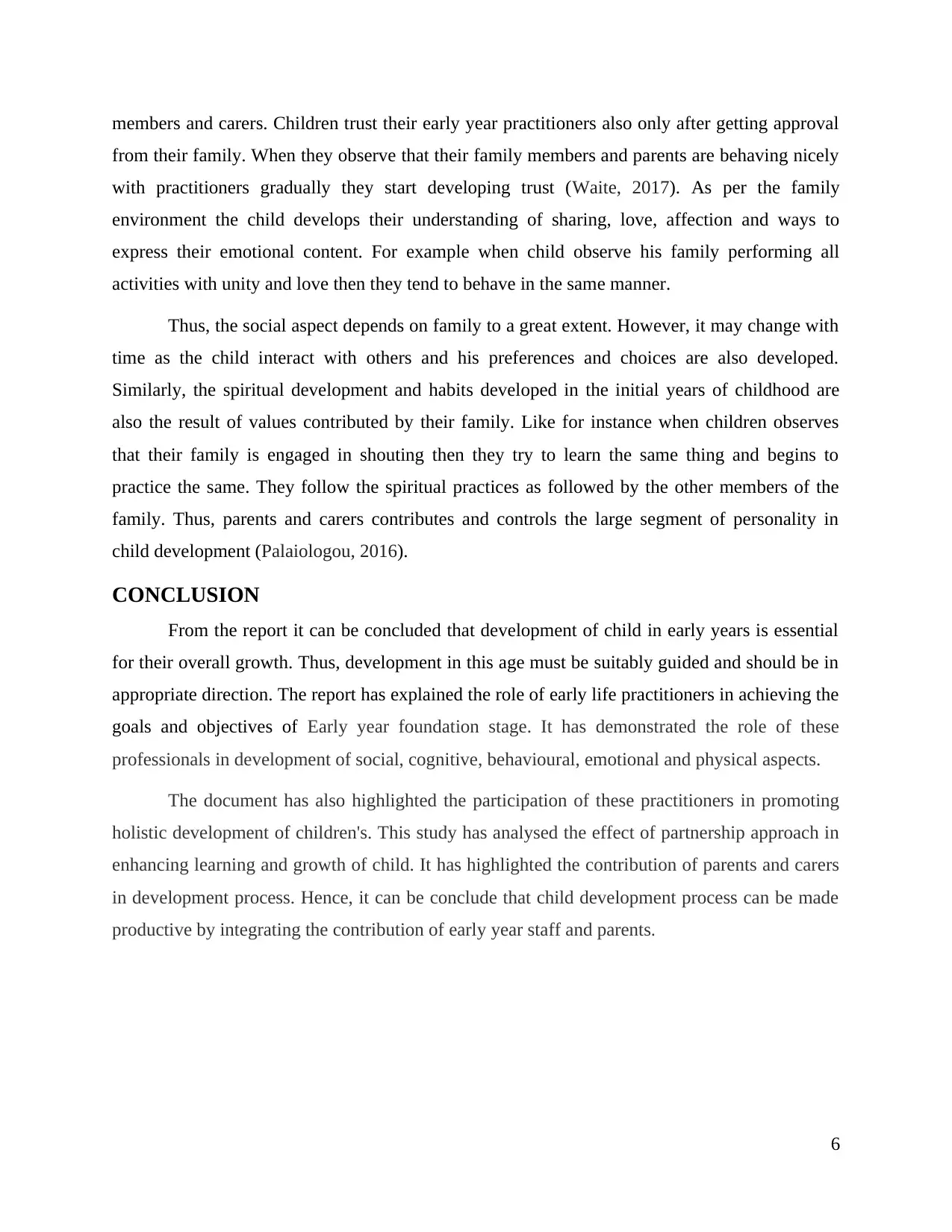
members and carers. Children trust their early year practitioners also only after getting approval
from their family. When they observe that their family members and parents are behaving nicely
with practitioners gradually they start developing trust (Waite, 2017). As per the family
environment the child develops their understanding of sharing, love, affection and ways to
express their emotional content. For example when child observe his family performing all
activities with unity and love then they tend to behave in the same manner.
Thus, the social aspect depends on family to a great extent. However, it may change with
time as the child interact with others and his preferences and choices are also developed.
Similarly, the spiritual development and habits developed in the initial years of childhood are
also the result of values contributed by their family. Like for instance when children observes
that their family is engaged in shouting then they try to learn the same thing and begins to
practice the same. They follow the spiritual practices as followed by the other members of the
family. Thus, parents and carers contributes and controls the large segment of personality in
child development (Palaiologou, 2016).
CONCLUSION
From the report it can be concluded that development of child in early years is essential
for their overall growth. Thus, development in this age must be suitably guided and should be in
appropriate direction. The report has explained the role of early life practitioners in achieving the
goals and objectives of Early year foundation stage. It has demonstrated the role of these
professionals in development of social, cognitive, behavioural, emotional and physical aspects.
The document has also highlighted the participation of these practitioners in promoting
holistic development of children's. This study has analysed the effect of partnership approach in
enhancing learning and growth of child. It has highlighted the contribution of parents and carers
in development process. Hence, it can be conclude that child development process can be made
productive by integrating the contribution of early year staff and parents.
6
from their family. When they observe that their family members and parents are behaving nicely
with practitioners gradually they start developing trust (Waite, 2017). As per the family
environment the child develops their understanding of sharing, love, affection and ways to
express their emotional content. For example when child observe his family performing all
activities with unity and love then they tend to behave in the same manner.
Thus, the social aspect depends on family to a great extent. However, it may change with
time as the child interact with others and his preferences and choices are also developed.
Similarly, the spiritual development and habits developed in the initial years of childhood are
also the result of values contributed by their family. Like for instance when children observes
that their family is engaged in shouting then they try to learn the same thing and begins to
practice the same. They follow the spiritual practices as followed by the other members of the
family. Thus, parents and carers contributes and controls the large segment of personality in
child development (Palaiologou, 2016).
CONCLUSION
From the report it can be concluded that development of child in early years is essential
for their overall growth. Thus, development in this age must be suitably guided and should be in
appropriate direction. The report has explained the role of early life practitioners in achieving the
goals and objectives of Early year foundation stage. It has demonstrated the role of these
professionals in development of social, cognitive, behavioural, emotional and physical aspects.
The document has also highlighted the participation of these practitioners in promoting
holistic development of children's. This study has analysed the effect of partnership approach in
enhancing learning and growth of child. It has highlighted the contribution of parents and carers
in development process. Hence, it can be conclude that child development process can be made
productive by integrating the contribution of early year staff and parents.
6
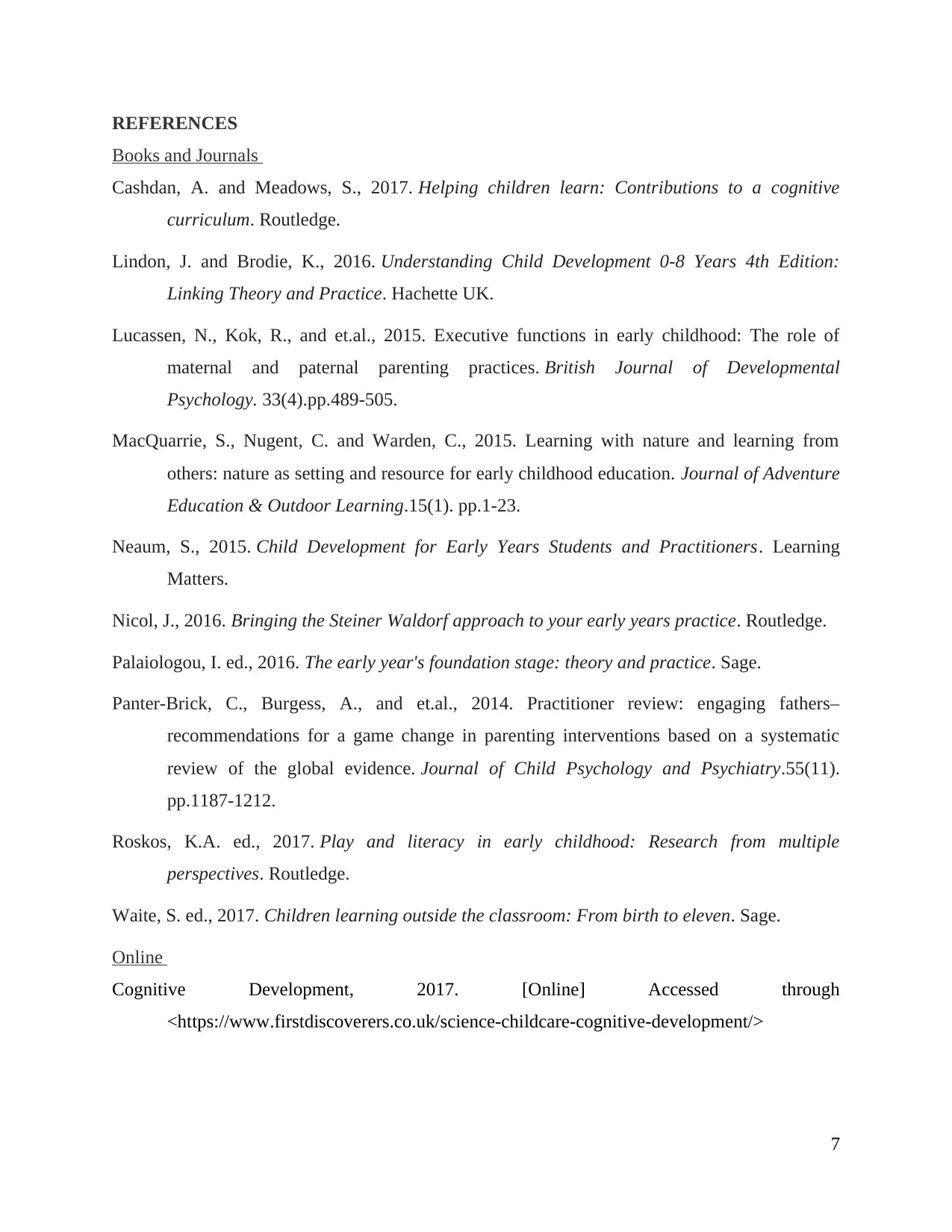
REFERENCES
Books and Journals
Cashdan, A. and Meadows, S., 2017. Helping children learn: Contributions to a cognitive
curriculum. Routledge.
Lindon, J. and Brodie, K., 2016. Understanding Child Development 0-8 Years 4th Edition:
Linking Theory and Practice. Hachette UK.
Lucassen, N., Kok, R., and et.al., 2015. Executive functions in early childhood: The role of
maternal and paternal parenting practices. British Journal of Developmental
Psychology. 33(4).pp.489-505.
MacQuarrie, S., Nugent, C. and Warden, C., 2015. Learning with nature and learning from
others: nature as setting and resource for early childhood education. Journal of Adventure
Education & Outdoor Learning.15(1). pp.1-23.
Neaum, S., 2015. Child Development for Early Years Students and Practitioners. Learning
Matters.
Nicol, J., 2016. Bringing the Steiner Waldorf approach to your early years practice. Routledge.
Palaiologou, I. ed., 2016. The early year's foundation stage: theory and practice. Sage.
Panter‐Brick, C., Burgess, A., and et.al., 2014. Practitioner review: engaging fathers–
recommendations for a game change in parenting interventions based on a systematic
review of the global evidence. Journal of Child Psychology and Psychiatry.55(11).
pp.1187-1212.
Roskos, K.A. ed., 2017. Play and literacy in early childhood: Research from multiple
perspectives. Routledge.
Waite, S. ed., 2017. Children learning outside the classroom: From birth to eleven. Sage.
Online
Cognitive Development, 2017. [Online] Accessed through
<https://www.firstdiscoverers.co.uk/science-childcare-cognitive-development/>
7
Books and Journals
Cashdan, A. and Meadows, S., 2017. Helping children learn: Contributions to a cognitive
curriculum. Routledge.
Lindon, J. and Brodie, K., 2016. Understanding Child Development 0-8 Years 4th Edition:
Linking Theory and Practice. Hachette UK.
Lucassen, N., Kok, R., and et.al., 2015. Executive functions in early childhood: The role of
maternal and paternal parenting practices. British Journal of Developmental
Psychology. 33(4).pp.489-505.
MacQuarrie, S., Nugent, C. and Warden, C., 2015. Learning with nature and learning from
others: nature as setting and resource for early childhood education. Journal of Adventure
Education & Outdoor Learning.15(1). pp.1-23.
Neaum, S., 2015. Child Development for Early Years Students and Practitioners. Learning
Matters.
Nicol, J., 2016. Bringing the Steiner Waldorf approach to your early years practice. Routledge.
Palaiologou, I. ed., 2016. The early year's foundation stage: theory and practice. Sage.
Panter‐Brick, C., Burgess, A., and et.al., 2014. Practitioner review: engaging fathers–
recommendations for a game change in parenting interventions based on a systematic
review of the global evidence. Journal of Child Psychology and Psychiatry.55(11).
pp.1187-1212.
Roskos, K.A. ed., 2017. Play and literacy in early childhood: Research from multiple
perspectives. Routledge.
Waite, S. ed., 2017. Children learning outside the classroom: From birth to eleven. Sage.
Online
Cognitive Development, 2017. [Online] Accessed through
<https://www.firstdiscoverers.co.uk/science-childcare-cognitive-development/>
7
⊘ This is a preview!⊘
Do you want full access?
Subscribe today to unlock all pages.

Trusted by 1+ million students worldwide
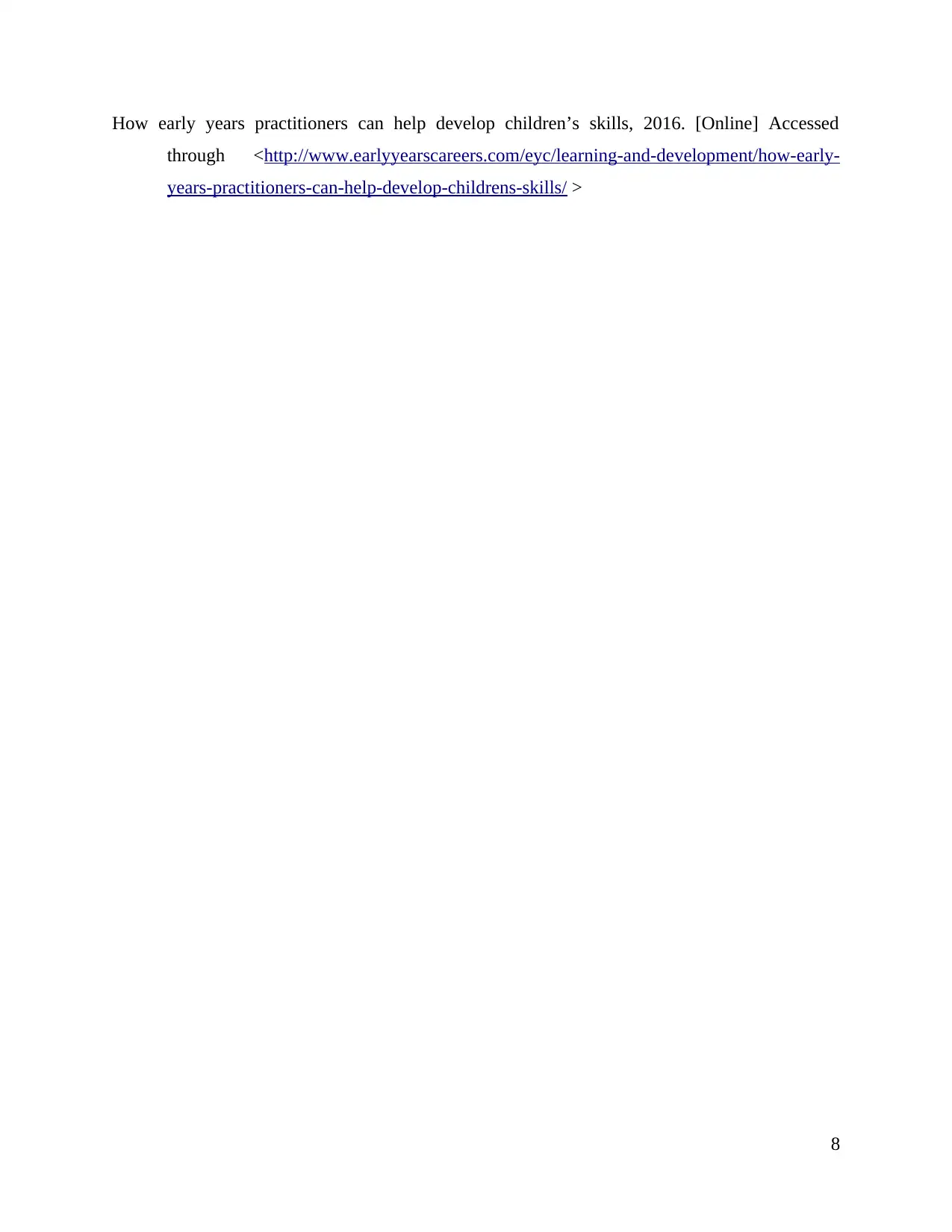
How early years practitioners can help develop children’s skills, 2016. [Online] Accessed
through <http://www.earlyyearscareers.com/eyc/learning-and-development/how-early-
years-practitioners-can-help-develop-childrens-skills/ >
8
through <http://www.earlyyearscareers.com/eyc/learning-and-development/how-early-
years-practitioners-can-help-develop-childrens-skills/ >
8
1 out of 10
Related Documents
Your All-in-One AI-Powered Toolkit for Academic Success.
+13062052269
info@desklib.com
Available 24*7 on WhatsApp / Email
![[object Object]](/_next/static/media/star-bottom.7253800d.svg)
Unlock your academic potential
Copyright © 2020–2026 A2Z Services. All Rights Reserved. Developed and managed by ZUCOL.





